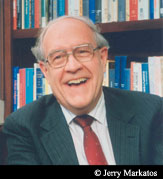 Wired Magazine features an interview with Fred Brooks, author of Mythical Man-Month and The Design of Design. My two favorite lines:
Wired Magazine features an interview with Fred Brooks, author of Mythical Man-Month and The Design of Design. My two favorite lines:
Brooks: You can learn more from failure than success. In failure you’re forced to find out what part did not work. But in success you can believe everything you did was great, when in fact some parts may not have worked at all. Failure forces you to face reality....
Wired: You’re a Mac user. What have you learned from the design of Apple products?
Brooks: Edwin Land, inventor of the Polaroid camera, once said that his method of design was to start with a vision of what you want and then, one by one, remove the technical obstacles until you have it. I think that’s what Steve Jobs does. He starts with a vision rather than a list of features.
Read the whole thing. I just wish the interview were longer.
(via Kottke)
(photo: Jerry Markatos/University of North Carolina at Chapel Hill)

